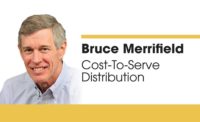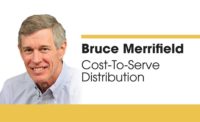This is one of the first insights that distributors who subscribe to line-item profit analytics are shocked to find out. Analytics reveal:
- Naturally high-margin-percent SKUs and customers mostly are net-profit dollar losers.
- Gross-profit dollars on small-dollar lines and orders are less than their cost-to serve dollars.
You can’t ignore transaction size or the variable service-people costs for customers with bill-me-later, paper-based trade credit.
And losses are bigger at branches that are replenished nightly from a main distribution center. The service value, such as 99% fill rates and local pickups for main-DC-only SKUs is big. However, having two piles of inventory at two facilities with doubled handling costs loses money at wholesale list markup prices.
These branches can charge more for their service value as Fastenal proves.
The two-step wholetail model
Fastenal pioneered two-step distribution to convenient wholetail locations. Their rental costs exceed those of wholesale DCs, but are less than retail space. So, wholetail overhead needs wholetail pricing and terms.
From the outset, Fastenal ignored suggested factory markups and charged what its service value supported. Fastenal knew high local fill rates save customers time. Fastenal’s overall margin rate peaked at 57% and was just under 50% for 2017 on $4.4 billion in sales.
Why don’t distributors charge more at two-step branches?
Contractor-supply distributors invariably tell me, “But, we thought we were making money!”
Sorry.
After backing out very profitable direct sales and DC-direct shipments that are credited to the branches, most branches lose money on their local stock sales.
Why not just set prices higher to be profitable? Most distributors assume customers would think they were gouging them and would switch to competitors that work on wholesale list margins.
Test beliefs: Sell various contracts
Here is where you should test your beliefs with analytics. The statement “All customers will feel gouged and defect to a competitor” is an extreme, data-free belief.
With customer profitability analytics at the branch level you can:
- Shift to higher prices with less costly terms; and
- Allow different customers to earn different discounts.
Better information provides more insight, more options and courage.
Here’s an example: A plumbing wholesaler shifted to the two-step Fastenal model and pricing. Customers initially complained about prices and threatened to leave. But, they stayed for the better fill-rate and time-saving value offered. Analytics shows this company’s profits are insane, just like Fastenal’s.
The moral of the story: Have the analytical clarity to move every customer to become net-profitable.





